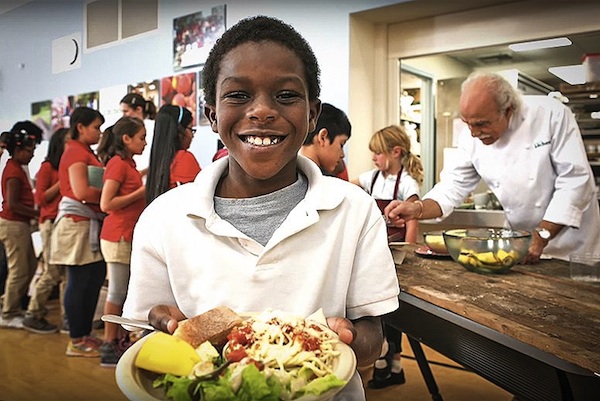Marin County’s school district is the first to make the shift—and it is largely low-income kids who will benefit.
The public school cafeteria has become a political battleground in recent years, with students, lawmakers, parents, and First Lady Michelle Obama fighting over what can and cannot be served. The push to reform nutrition standards for students has made headway; thanks to the Healthy, Hunger-Free Kids Act, schoolkids are served more whole grains, fewer calories, and less trans fat, saturated fat, and sodium.
In Marin County, California, students in the Sausalito Marin City School District will find their first school lunch of the fall going far beyond that: The district will be the first in the nation to go 100 percent organic. After a two-year pilot program at Bayside MLK Jr. Academy in Marin City—where 95 percent of students qualify for free or reduced-price meal programs—the administration is expanding the all-organic lunches to Willow Creek Academy in Sausalito.
Advertisement
The district, which has just 500 students, may serve low-income students, but those kids and their families are the minority in Marin County. Marin City, where 156 students at Bayside Martin Luther King Jr. Academy enjoy all-organic meals, has an average household income of more than $135,500. Average household income in the United States was $51,939 in 2014.
That hasn’t kept districts with less flush tax bases from changing their purchasing habits. A USDA study found that during the 2011–2012 academic year, 43 percent of U.S. schools were involved in the federal Farm to School program, with a total of 38,600 schools across the country buying $354 million worth of food from local farms. District employees who handle the purchasing of USDA commodity ingredients—paid for with federal entitlement funds—are also given a lot of leeway in terms of what they buy and from whom. For example, in Harrisonburg, Virginia, which has a median household income of $36,835, the public school district purchases ground beef from local farms that raise their cattle on pasture and finish the cows on corn silage—a far cry from pink slime.
In Marin County, the school district is outsourcing its food sourcing and preparation to the nonprofit Turning Green, which works on health and food sustainability issues, with an emphasis on youth and education. According to the Turning Green website, teachers at Bayside MLK Jr. have seen a 67 percent decrease in disciplinary cases since the pilot program started.
“Students everywhere are vulnerable to pesticide residues and unsafe environmental toxins,” Judi Shils, executive director of Turning Green, told EcoWatch. “Not only does this program far exceed USDA nutritional standards, but it ties the health of our children to the health of our planet. It’s the first program to say that fundamentally, you cannot have one without the other.”
Source: TakePart
